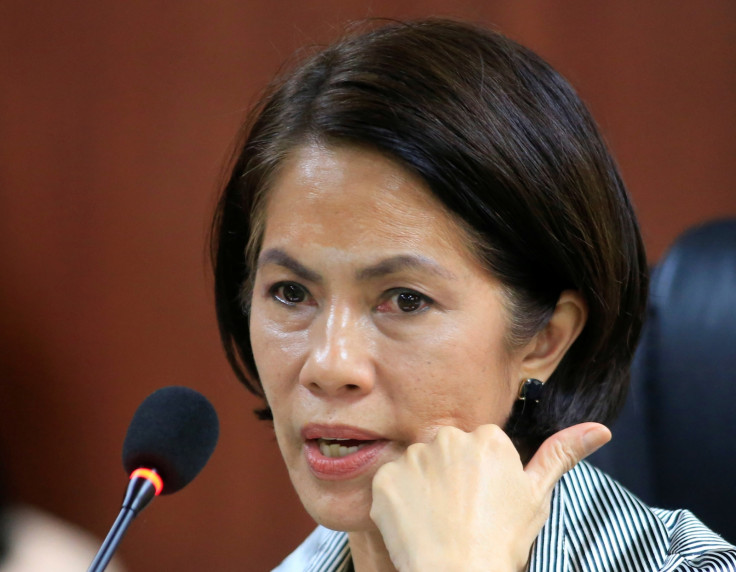Philippines government scramble to deal with fallout from mines closure decision
Environment Minister stands by decision to close 23 of 41 mines and says country 'unfit for mining'.

The Philippines government is scrambling to deal with the fallout from the Environment and Natural Resource Secretary Regina Lopez's decision last week to close 23 mines and suspend five others over environmental concerns.
Lopez who has insisted that her country was "unfit for mining" as she stood by her surprise decision, has caused panic among regional lawmakers who will now have to deal with the huge loss in revenues to local governments and the livelihoods of 1.2 million Filipinos.who rely on the mining industry.
The Finance Department has ordered local treasurers to assess the revenue impact of the mine closures in their respective areas, Manila Standard reports.
"Our primary concern is the revenues of the municipalities. That's why we asked the treasurers to give us a quick-round assessment of how much is going to be lost in revenues," Finance Secretary Carlos Dominguez III told the paper.
"The Cabinet members are obviously also very concerned about unemployment and people not having income, so we will put our shoulder to the wheel to address that issue first," Dominguez said.
Initial data from the Bureau of Local Government Finance indicate that at least 10 municipalities and one city will be hit by the 23 mines closure and the suspensions will affect another city and four municipalities.
Labour Secretary Silvestre Bello III also warned that although the government could provide emergency employment to affected workers, this would only be a temporary measure.
While Ernesto Pernia, the Socio-Economic Planning Secretary defended Lopez's decision saying that he did not think it was done arbitrarily, he acknowledged there was a need for "more scientific and data-driven studies.
"Obviously, it will have an effect on the gross domestic product (GDP) and employment but we don't have the hard data," he said.
Did Lopez go beyond the audit's recommendation?
The minister is said to have gone beyond the recommendation of the team that reviewed the audit of the industry. According to Reuters, two people with knowledge of the matter, claimed that the team had recommended only the suspension of the mines' operations and the imposition of fines for environmental violations.
The review team did not recommend the closure of the mines.
Reuters described the 63-year old minister as "a long time environmentalist" who took over the department that oversees the mining sector in June 2016.
Lopez however said that she chose to close many of the pines permanently to enable her to access rehabilitation funds. "If it is closure, I can then heal the land. It is closure because there is no way you can have any kind of mining in watershed areas."
"Every time you put up an open pit and every time you put up a tailing pond you're putting our country at risk, Lopez said in an interview with Reuters on 6 February at her office in Manila.
"It's really unfair. I'll be so blatant to say the Philippines is unfit for mining. Because we're an island ecosystem with biodiversity and endemicity like no other," she said. "They're killing our rivers, our streams, they're mining in watersheds, That's against the mining law."
The mines ordered to be closed represent about half of Philippines' mining output. The Southeast Asian nation is also the world's top nickel ore supplier.
Lopez is set to formally present her proposal to the Cabinet on Tuesday (7 February). President Rodrigo Duterte has already said that Philippines can survive without a mining industry.
Carlos Arcilla, the director of the University of the Philippines National Institute of Geological Sciences said he was puzzled why the mining firms were not given copies of the mining audit.
"The basis for the mine closures have not been made public, and they have not been given to the mines that are to be closed. This tells me that the main basis for mine closures is emotion, superficial impressions," Arcilla added.
Mines closure will cripple local governments
In a statement, the Chamber of Mines of the Philippines asked Duterte to review the order issued by Lopez, calling them "irresponsible, unfair and illegal."
In the 6 February statement, the chamber's chairman Art Disini said: "Her actions have finally revealed her true bias: to stop all mining in the Philippines."
It lambasted Lopez for turning a blind eye to illegal, undocumented, non-taxpaying and non-complaint mining operations, that it claims were "the real violators of [the] environment."
The Chamber also warned that her closure order will affect about $22bn worth of investments.
"She is attacking the only industry in the country that has actually replanted over 20 million trees nationwide in the past few years along, deceptively using images of active mining areas as 'evidence' that no rehabilitation is happening ... and slowly killing an industry that has faithfully paid billions in taxes and fees annually."
Congress urged to determine if Lopez's decision legal
In the House, Representative Rodel Batocabe urged Congress to exercise its oversight powers to determine if Lopez's actions were legal.
He said that while he supported responsible mining, Lopez's department should ensure that any decision made should not hurt an industry that has "contributed significantly to the economy."
© Copyright IBTimes 2025. All rights reserved.




















